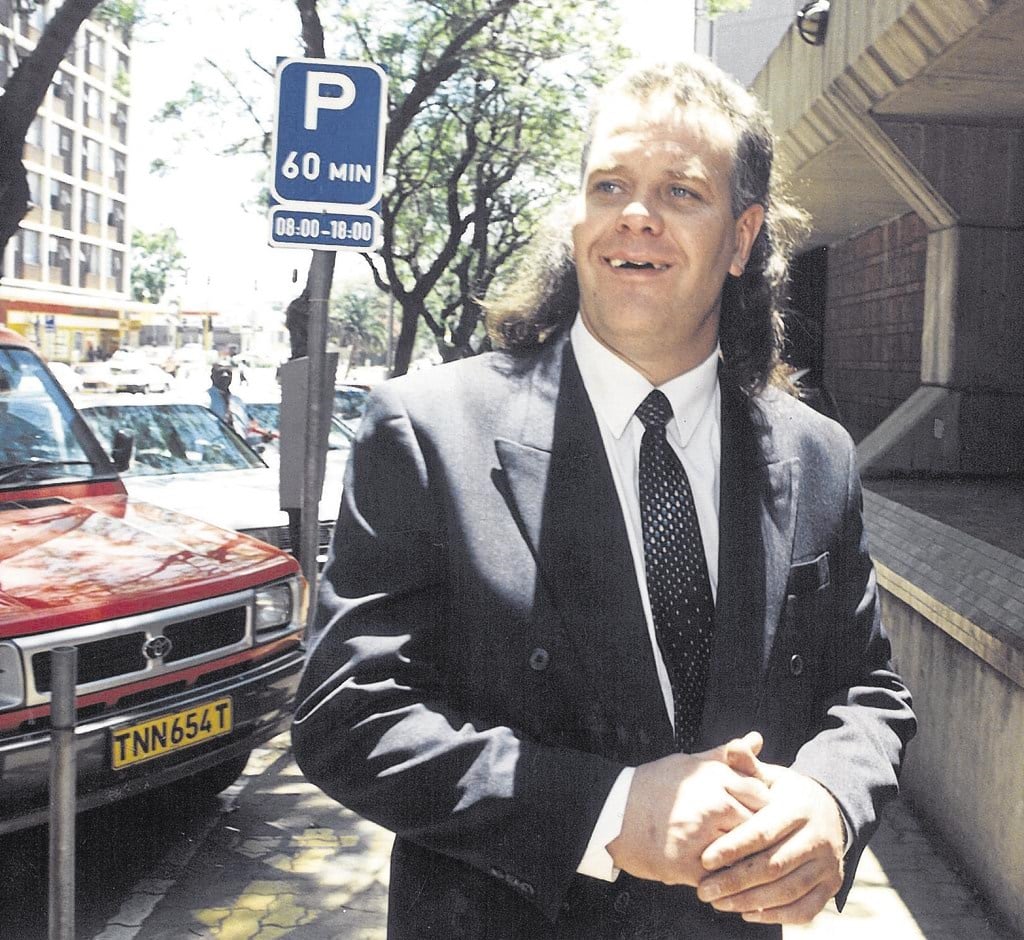
Gangster, state agent, killing machine, brothel owner, hoodlum, fraudster, crack addict.
If you really want to understand apartheid era hit man Ferdi Barnard, who is officially being released on full parole from prison following a decision by Justice Minister Michael Masutha, you have to turn to the pages of Jacques Pauw's chilling book Into the heart of Darkness.
It is here, where Pauw describes the moment when Barnard, preparing a crack pipe while sitting in a car in Melville, confesses to the 1989 murder of activist Dr David Webster.
His head was bouncing and hopping like a rubber ball on his broad shoulders, while clutched between his thumb and forefinger was a thin glass syringe, stuffed with a mixture of tobacco and small cocaine crystals. He had lit the pipe a minute before, and a whiff of cigarette tobacco and chemical substance was filling the car.
“It’s true. I killed him,” he suddenly said, kept quiet for a second or two, and let rip again: “It’s true. I shot him.”
“Who?” I asked him.
“David Webster.”
Sitting next to me sucking on his crack pipe was Ferdi Barnard, one of apartheid’s most infamous hoodlums, a Rambo-esque killer who moved between the criminal underworld of drug dealing, prostitution and diamond smuggling, and South Africa’s official business in the government’s dirty tricks units and death squads.
The tiny orange coal in his crack pipe glowed brightly in the afternoon light as it slowly burned down the syringe, consuming the crystals and tobacco. He blew a streak of white smoke against the front window of the car where it exploded into a million molecules.
“He flew through the air and landed on the pavement. I saw it, because I shot him. I did it.”
Before he continued, he put the pipe in his mouth again and inhaled the mixture into his lungs. “It was all that tea parties and shit. That’s why we killed him. I pulled the trigger, I shot him.”
We looked at one another. I didn’t say anything, too scared to interrupt him and stop a confession.
“I was paid a R40 000 production bonus after the killing. For a job well done. It was an approved operation and Joe Verster [then director of the Civil Co-operation Bureau] knew about everything.”
Ferdinand Barnard was a member of a government sponsored death squad, the South African Civil Cooperation Bureau (CCB). It was a network of ex cops, recces and criminals which was responsible for a reign of assassinations, bombings and intimidation. Barnard was one of the most notorious of the CCBs agents – as a former narcotics bureau detective, murderer and underworld hard man, he slotted right in.
He had left a trail of violence but somehow, nothing ever managed to stick to him. As a young cop he had been convicted of a double murder but that seemed to add more to his reputation in the CCB than against it. There were lingering stories about how those who threatened to speak out or testify against him were either threatened or ended up dead.
Webster's assassination
The most high profile of his crimes would be the brutal assassination of David Webster. In the late 1980s, Webster was a university lecturer and a campaigner against apartheid, in particular against detention without trial. As a leading figure in the Detainees’ Support Committee during the State of Emergency, Webster regularly intervened and arranged what became known as ‘tea parties’, gatherings for detainees and their supporters. His work drew international attention to the issue and was a thorn in the side of the government.
On a Saturday morning in 1989, Webster and his partner Maggie Friedman took their dogs for a walk. On their return, Webster parked his van outside his house in Troyeville and let the dogs out. A vehicle pulled up alongside him and a hitman armed with a shotgun opened fire. Webster’s murder fuelled speculation and intrigue. Barnard and former rugby player and detective Calla Botha were taken in by authorities a few months after the hit but they were soon released. Barnard publicly denied responsibility for years.
Then in 1998, he was found guilty of Webster’s murder, as well as the attempted murder of struggle stalwart Dullah Omar, amongst numerous other crimes. He was sentenced to two life sentences and an additional 63 years in prison.
During his criminal trial in the Pretoria High Court, his ex-girlfriend Amore Badenhorst testified as a witness for the State. She spoke about how scared she was of Barnard and his friends, but how she loved him regardless.
She testified about how she felt bitter about the way Barnard had treated her - one cold winter when he refused to pay for her water and electricity and she had to cook her food on an open fire outside stood out in her memory - but said she had never meant to harm him. She said her situation had come about out of desperation, because she wanted to get away from Barnard and from the drugs he had introduced her to.
Barnard's ex-wife, Maryna Language, also testified about how the CCB had supplied him with a hitlist which included Winnie Madikizela-Mandela, Desmond Tutu, Swapo activist Anton Lubowski and slain SA Communist Party leader Chris Hani. She said the hitlist used to lie around in their house and shortly before Webster's murder in May 1989, Barnard told her he was a hitman for the CCB.
She said Barnard told her he would be paid to take out Webster because the academic had a high profile in the ANC. "I didn't believe him. I thought he lived in a dream world, but after Webster was killed I had to believe him," she said. Language also testified that the night after Webster was murdered Barnard told her in detail about the shooting.
"He said Webster was busy unloading plants from a bakkie and was standing in the street. He saw that this was the ideal opportunity to do the job then and there. He shot Webster with a shotgun and said Webster's wife screamed like a stuck pig… He said after Webster's death he received a R90 000 production bonus. He used the money as a deposit for a new house, to which he moved a few months after Webster's death," Language told the court.
In the years post CCB and before he was sent to jail, during the 1990s, Barnard went wild in Joburg’s underworld. He rode the crack train and owned an upmarket brothel in the city’s northern suburbs called The Palace, as well as another called Club 69. He ran scams involving diamonds and printed counterfeit cash.
'These were not people that you wanted to tangle with'
Private investigator Chad Thomas recalls the kind of reputation Barnard had at the time.
“I was a young man in the late 1980s -early 1990s just beginning my career with the state. I lived and worked in Hillbrow for a while. The Lodge (also known as The Breakers) in Abel Road was a no-go area for me and my friends and colleagues. We all knew that this was where the seriously heavy guys were based. It was an open secret that Ferdi and the others around him were involved in off the books state-sanctioned work and there was talk about them being involved in extra judicial killings. Ferdi and his compatriots were the kind of people that made you cross the road if you saw them up ahead and to leave a club if you saw them entering. These were not people that you wanted to tangle with.”
In the announcement of the decision to release Barnard on parole, Minister Masutha explained that as part of the consultations prior to finalising his decision, he personally engaged with Friedman. “After raising her concerns with Minister Masutha, Ms Friedman indicated that she had no objection to the placement of Mr Barnard on parole,” read the statement.
“It is important to note that parole placement for Mr Ferdinand Barnard does not mean the end of his life sentence. He has been transferred to the Community Corrections Office which will supervise and monitor him as he will be serving the remainder of his sentence in the community for the rest of his natural life. As with other parolees, the parole conditions of Mr Barnard will be subjected to continuous review and may be changed depending on his personal conduct.”
'He’s entitled to a good and nice life'
Ex-CCB agent Colonel Staal Burger says Barnard’s release is long overdue and it’s time for his old colleague to be free and for society to look forward.
“It’s a long story you know, but I think it’s a good thing that he’s released. I think it’s overdue if you compare it with the bullshit story of Schabir Shaik and all those who are out on lies. He’s done his due and he’s entitled to a good and nice life and I hope he gets the support from the public,” says Burger. “The way I know him I think he’s done his time and the board would have made that decision, whether he’s been rehabilitated. We must rather forget about the past and look at the future and look at it as a positive way. And if I can help him I will.”
'He loved to be feared'
For Pauw, who has tracked Barnard’s destructive path through life, violence has always been quick to follow and the former hitman and gangster has been very lucky to be given yet another chance at freedom.
“He has, throughout his life been an extremely violent person. Remember that he was convicted of double murder when he was a young Sanab policeman. He got a very small sentence. When he left prison, he started working for CCB. Drugs, prostitution, diamonds, robberies, murder. Name it and he did it. It seems at the time when I knew him (1991-1996) that he loved what he did. He loved to be feared. He loved his power. He is lucky to be released on parole.”




 Publications
Publications
 Partners
Partners























